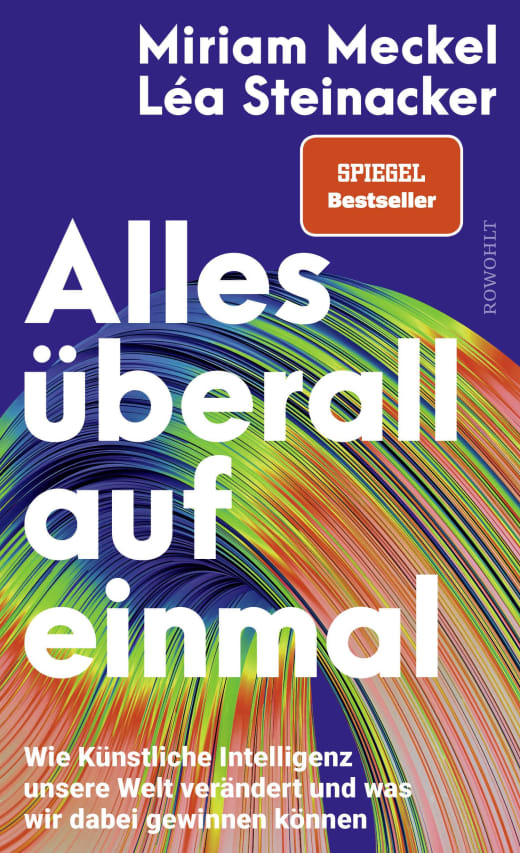Why we recommend this book: Artificial intelligence is changing the way we work, our jobs, our homes and our lives. For each and every one of us, the question arises as to which activities are still carried out by ourselves and which are performed by AI, robotics and automation. For us humans, it is not only essential to sharpen the competences and skills that will continue to be in demand on the labour market.
We have to find our way in an increasingly complex world that is completely new to many of us and also frightening. We recommend this book as basic reading, as the two authors present the developments and changes very clearly and without populist ulterior motives. They advocate actively shaping this new world and this multitude of possibilities, but also point out the dangers and challenges.
Picture above: The two authors Miriam Meckel (left) and Léa Steinaber. Photo credits: Stephanie Pistel
The democratization of artificial intelligence
Artificial intelligence has long been part of our lives – even if we are not aware of it. Services such as Netflix, Siri and Google are already working with AI: recommendations are personalized and tailored to our personal wishes using artificial intelligence. It is also on board when we unlock our cell phone using facial recognition. In the book, the two authors also roll up the long history of development – all the way back to Ada Lovelace, who described in 1843 how technology would one day reproduce everything that can be described with logic.
So there have been applications in the background for years, but we didn’t have direct access to them. And that is exactly what is changing now.
ChatGPT makes this technology available to each and every one of us. AI is becoming a mass application. For the two authors, this means that everything is changing everywhere and all at once.
The title was inspired by the 7-time Oscar-winning film “Everything Everywhere All at Once.” Because AI applications will completely change the way we live, work, run companies and do business, communicate and make politics. Disruptive and highly dynamic, these technologies represent a huge opportunity for us – if we understand them and set the right course. The aim of the two authors is to develop an understanding of these technologies and their applications and to dispel fears. They argue that applications should be designed jointly, thoughtfully and ethically.
A universe of possibilities
When fear is stirred up about artificial intelligence, it is often driven by business interests. We are not being replaced as humans, quite the opposite: AI means a multitude of possibilities. And it also means that we can focus on the human and interpersonal aspects. Generative AI will not replace craftsmanship or care. But: AI will support these jobs, for example by reducing or completely eliminating bureaucracy and tedious routines.
Another example is concerts: Music is available everywhere online, but we still go to concerts. And we take part in video conferences as avatars, but we also travel the world in person and go on vacation. The challenge is to make the smartest possible use of a universe of possibilities.
If one reads about horror figures, millions of jobs lost, this data can be put into perspective very quickly. There is much speculation as to which jobs will be affected by these developments. The two authors offer a very deep insight here: It is not about downsizing at the job level, but rather about individual work steps. AI applications take over individual work steps in a series of tasks. AI is not just AI – these are very individual technologies and applications. Automation in sales and marketing, for example, looks different from AI-supported accounting.
Automation will not only affect so-called blue collar jobs – i.e. jobs involving physical and manual labor. It will also affect many white collar jobs: This includes management and executives, lawyers, finance and consultants. This means that each and every one of us should ask ourselves whether there are work steps that can be made easier or taken over by AI.
One example: Texting and formulations, especially with many templates, standards and samples, are particularly affected. Author’s note: AI will turn journalism on its head – but also make it easier. There are always several angles from which changes can be viewed. And it depends on how we use these tools.

There are challenges lurking, undesirable side effects and ethical dilemmas
One example of very challenging side effects is political communication, or rather: Disinformation. In 2024, more than half of the world’s population will vote. AI makes it possible to create a deep fake video or clone voices within a few minutes. The current US election campaign already provides an example: A robo call – an automated call – with the voice of US President Joe Biden urged his Democratic supporters not to go to the polls. There was also a Chinese AI-backed disinformation campaign in Taiwan in January 2024 to influence the election (note: To enable the reunification of Taiwan with China).
In the 2016 US presidential election, only 6% of all news was identified as fake news. Only 1% of users were responsible for 80% of the misinformation. That is very little – but is now changing thanks to generative AI. Text, images, sound and video: All of this can be produced very quickly and also very cheaply with just a few basic skills using new tools.
For us, this means that we can no longer trust voices, photos and videos. It is becoming increasingly important to take a critical approach to information and media content.
There’s a great anecdote in this chapter that describes a press conference with Rudy Giuliani in front of a rolling gate covered in Trump stickers in the Pennsylvania pampas. A PR disaster and fake event in a class of its own, which even has its own documentary: Instead of taking place in the posh Four Seasons Hotel, the conference was held outside the rolling gates of Four Seasons Total Landscaping. This major PR mistake – they actually wanted to communicate fake news about Donald Trump’s re-election again – became a worldwide meme. Contemporary history sometimes has humor.
The book’s strength lies in its ability to present even complex concepts and contexts clearly and comprehensibly.
Conclusion
The two authors bring scientific research findings to life with entertaining anecdotes and insights from “real life”. Her analyses are based on theory and practice, making them lively and comprehensible even for non-experts.
They also encourage self-reflection in this book: What is my relationship to technology and AI? What role does AI play in my job and in my private life? How will this role change and with it my job? This is always linked to thoughts on privacy, surveillance and, of course, power and its redistribution. Meckel and Steinacker argue for a considered and ethical approach to these technologies, which will completely turn all our lives upside down.

Miriam Meckel & Léa Steinacker:
Everything everywhere at once
How artificial intelligence is changing our world and what we can gain from it










